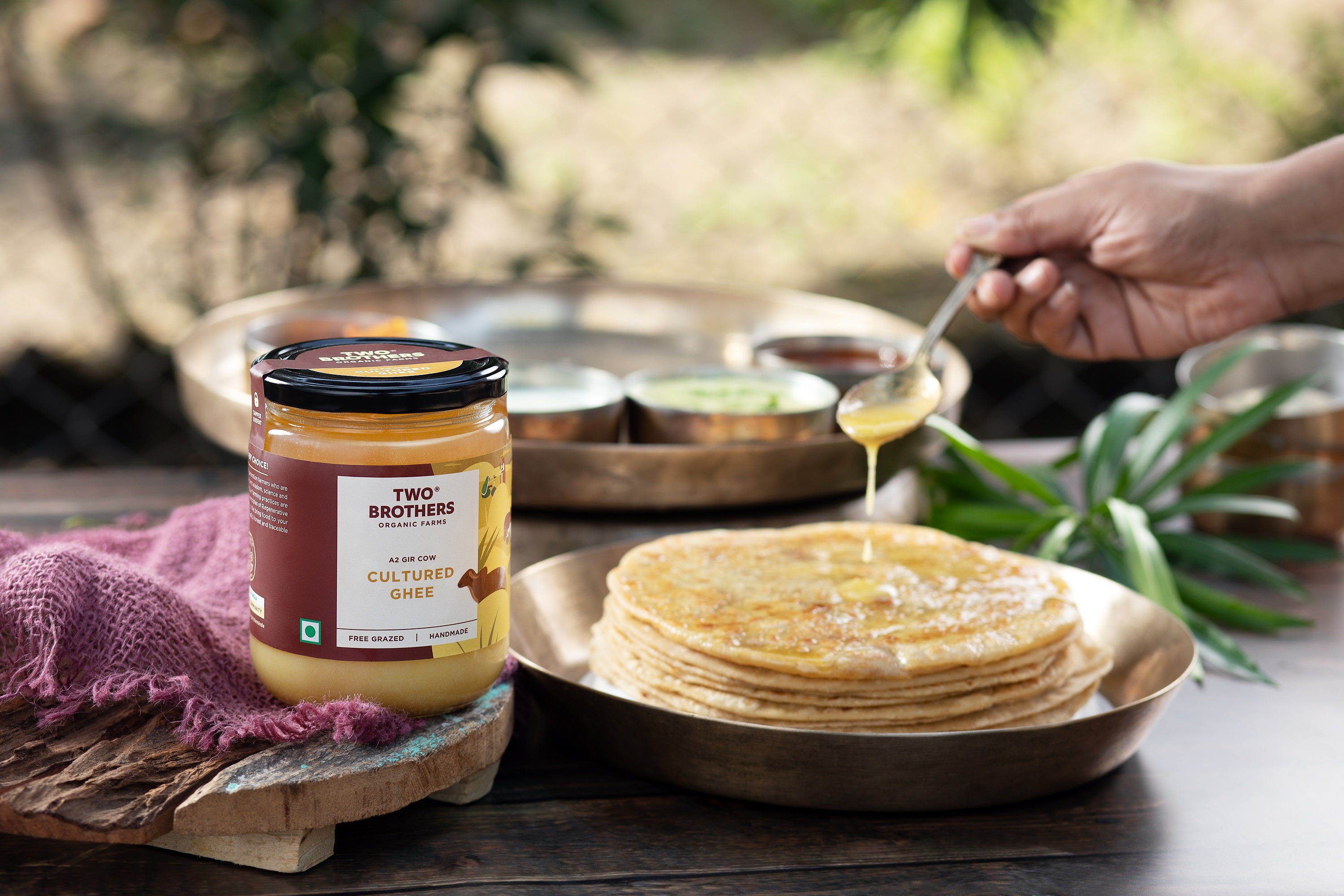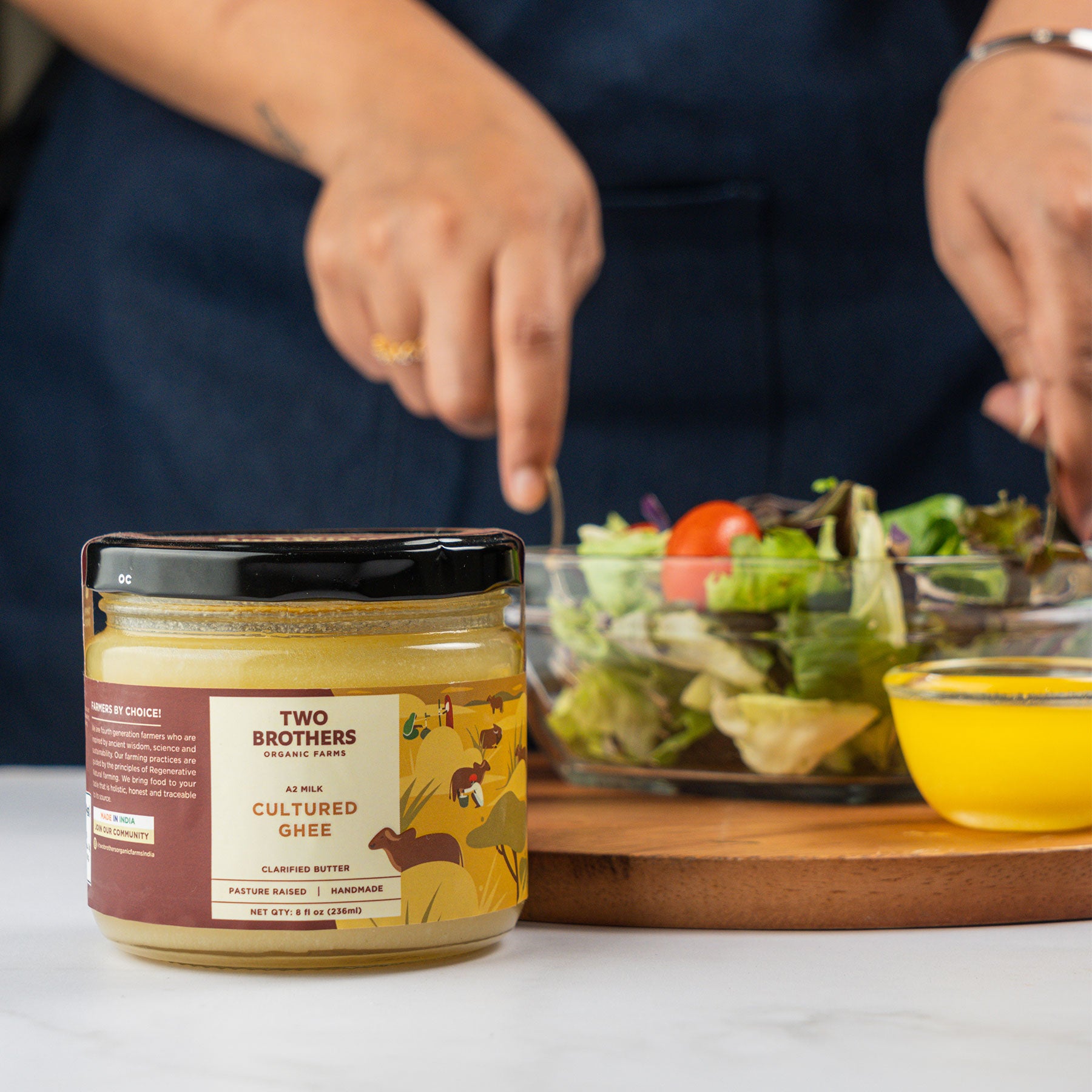Using oil as a moisturiser or for ‘chumpy’ is one thing. But using it for cooking is completely different. It requires a lot of patience and research to find the right oil for the right cooking methods– some are ideal for baking, others for salad dressing, and then there's 'Ghee,' a versatile contender that can handle it all.
Before the discovery of plant-based oils, ghee was used as the primary cooking oil in India to cook food. Surprised?
But what made ghee such an exemplary cooking oil? What about your regular refined oil and butter? Aren’t they enough to provide nutrients and keep you healthy?
Well, if you were thinking that your regular refined oil is an all-rounder cooking oil, you are in for life-changing revelations about cooking oils, ghee, and butter.
Moreover, we will answer the prime question– is ghee a healthier alternative to cooking oil & butter?
Let’s find out!
|
Table of Contents
|
Did You Know?
The best way to get the most from ghee, butter, and oil is to use all of them in your cooking. Consuming one type of fat will provide a certain set of nutrients. This can lead to deficiencies. By consuming good-quality ghee, butter, and cold-pressed oil, you can avail the nutrients from all of them, reducing the chances of deficiency.
Now, we will kick-start this discussion of whether ghee is a healthier alternative to cooking oils and butter with a basic question, i.e., what makes any fat good for cooking?
6 Reasons Why Ghee is Better Than Oil And Butter
Cooking oils, butter, and ghee are the staples of our kitchen pantry. We rely on them for flavours, texture, and nutrients too. However, sometimes while cooking we forget about the most important aspects of the cooking oils– their characteristics!
Here are 7 parameters on which we evaluated ghee, oils, and butter to determine if ghee is better than oil and butter. Let’s understand them one by one.
1. High Smoke Point of Cooking Oil
If you love eating fried foods, you should know about Smoke Point. The smoke point is the temperature at which the oil starts to burn, and beyond that, it is no longer fit for cooking. It depends on the composition of fats.
The smoke point of butter is 177°C, and that of ghee is 252°C. The smoke point of most unrefined cooking oils ranges between 107°C to 207°C, and that of refined oils is up to 240°C.
So, which fat can be used for cooking? It depends on the cooking method and a few more factors discussed below.
2. Flavours of Cooking Oil
Flavours are the primary requirement of food. A fat that adds flavour to your food and complements the other ingredients is crucial. Fats and oils act like carriers for the ingredients and help everything-sing together. The taste of each cooking fat determines the flavours of the cooked food. So, it is important to choose the right oil for your cooking.
For instance, desi ghee has its own rich, earthy, and slightly sweet flavour profile. You can easily differentiate between a ‘desi ghee ka gujiyas’ and refined oil ‘gujiya’ or ‘aalu ka paratha’, right?

Similarly, butter is creamier, heavier, and can have a salty or a little sweet flavour when not cooked. Everyone loves a buttered toast, instead of a refined oil toast.
Moving forward, the flavour of the cooking oils solely depends on their seeds. Mustard has a pungent, strong aromatic flavour; and coconut oil has a hint of coconut to it. Their respective flavours complement the dishes.
3. Stability of Cooking Oil
The stability of oil while cooking is crucial. As we cook, the heat requirement changes, and so does the temperature of the food. A recipe that starts with simple baking at 140°C might have to be increased to 180°C or more by the end.
So, the cooking oils must be stable throughout the cooking process to cook a healthy meal, rather than consuming burnt oil.
The cooking oils that have a higher smoke point, like ghee and coconut oil remain stable throughout the cooking and can handle temperature changes than butter.
4. Nutrient Profile of Cooking Oil
There’s an old saying that food is medicine if cooked correctly. Cooking fats is also a way of including nutrients in your diet. Many nutrient deficiencies are caused by an imbalanced diet. By including nutrient-rich cooking fats regularly, one can get many nutrients easily.

For instance, desi ghee is a rich source of vitamins (A, D, E, and K), minerals (phosphorus, calcium, and magnesium), antioxidants (beta-carotene), butyric acid, squalene, and more. It is made of short-and medium-chain fatty acids, making it easier to digest and absorb. Also, it has good fats that lower the body's bad cholesterol.
5. Process of Making
The process of production is crucial when considering the purchase of cooking oil, ghee, or butter. Let’s look into them one by one.
- Cooking oils are extracted in two ways– refined and unrefined oils. Refined oils are made using machines and chemicals at high temperatures. The final product loses a lot of nutrients during the process. Unrefined oil is made using wood presses, no heat is involved, and no chemicals are used. They have a richer taste, aroma, and nutrients.
- Ghee is made using curd or milk cream or store-bought butter. The A2 ghee made by using the curd to churn butter and heating it slowly to separate the ghee and milk solid is of good quality. It is richer in flavour, aroma, and nutrients.
- Butter made from curd is of better quality compared to butter made from milk cream.

6. What It’s Made from?
The quality of the basic ingredients used to make cooking oil determines everything– flavours, nutrients, health benefits, smoke points, etc. You should start by looking at the seed quality used to make the cooking oil, the animal breed, and the fodder it eats to produce milk for making ghee. The same for butter as well.
Let’s elaborate on it a bit.
- Ghee: It is known that grass-fed cows and buffaloes produce healthier milk than grain-fed cows. Also, the native Indian breeds of cows like Gir and Sahiwal have A2 protein in their milk, which is easier on the stomach and has many health benefits, compared to the hybrid cow breed, which has A1 protein, which is difficult to digest and causes other health issues.
- The same approach goes for the butter. The butter made from the milk of organic grass-fed cows and buffalo is healthier.
- Cooking oils can also be tested for it. Be sure that the seeds used to pulse out oil are of native variety, and organic, and don’t have preservatives, chemical fertilizers, or pesticides sprayed on them.
Here is some more information about ghee, butter and a few cooking oils regularly used in India to help you find the best cooking oil for yourself.
FAQs: Is Ghee a Healthier Alternative to Cooking Oil & Butter
Is ghee better than oil?
Ghee is known as an all-purpose fat. It can be used for cooking, body and head massages, beauty, and health remedies, and it offers various health benefits like boosting immunity, protecting eyes, heart, and liver, improving brain function, memory, bone and muscle health, and many others. So, yes ghee is better than oil if you wish one oil to take care of all the above-mentioned benefits.
Is ghee healthy for you?
Yes, ghee is healthy for you when used in moderation, like any other potent substance. Consuming ghee every day in moderation is considered a good practice, as it comes with many health benefits.
How many spoons of ghee per day?
Any healthy, active adult can consume 3 to 6 tsp of ghee daily. If you are a family of 4 adults you can use 12 to 24 tsp of ghee to cook food in a day. That is a fair amount of ghee to cook healthy and delicious meals in one day.
Which is the best time to eat ghee?
The best time to eat just ghee is early in the morning on an empty stomach. It gets absorbed easily and covers the gut with a lining, helping in relieving constipation, stimulating bowel movement, and secreting digestive juices.
Is ghee good for old age?
Ghee has several health benefits and can be consumed at any age, including old age. Consuming A2 ghee is especially beneficial, as it is easy to digest. However, make sure to consult your doctor to understand the amount and when to consume it.
Conclusion
After looking at several parameters to check if ghee is better than oil and butter for cooking, it’s time to conclude this blog.
Ghee has an edge over both cooking oil and butter when it comes to smoke point, stability, nutrients, and flavours. It can also be used in any dish, irrespective of the method of cooking. Organic A2 cow ghee has bonus benefits in all ghee categories.
Cooking oil and butter are also equally important for personal preferences and flavour profiles. You can use all three by swapping oils between meals. In this way, you can get the nutrients, health benefits, and flavours of all three types. So, what do you think? Is ghee a healthier alternative to cooking oil?
Just remember to pick the best-quality ghee, cooking oil, or butter for cooking. If you are in search of a trusted brand that has been making ghee and farming products organically, check out Two Brothers Organic Farms. We provide organic cultured A2 cow ghee and other ghee varieties too.










